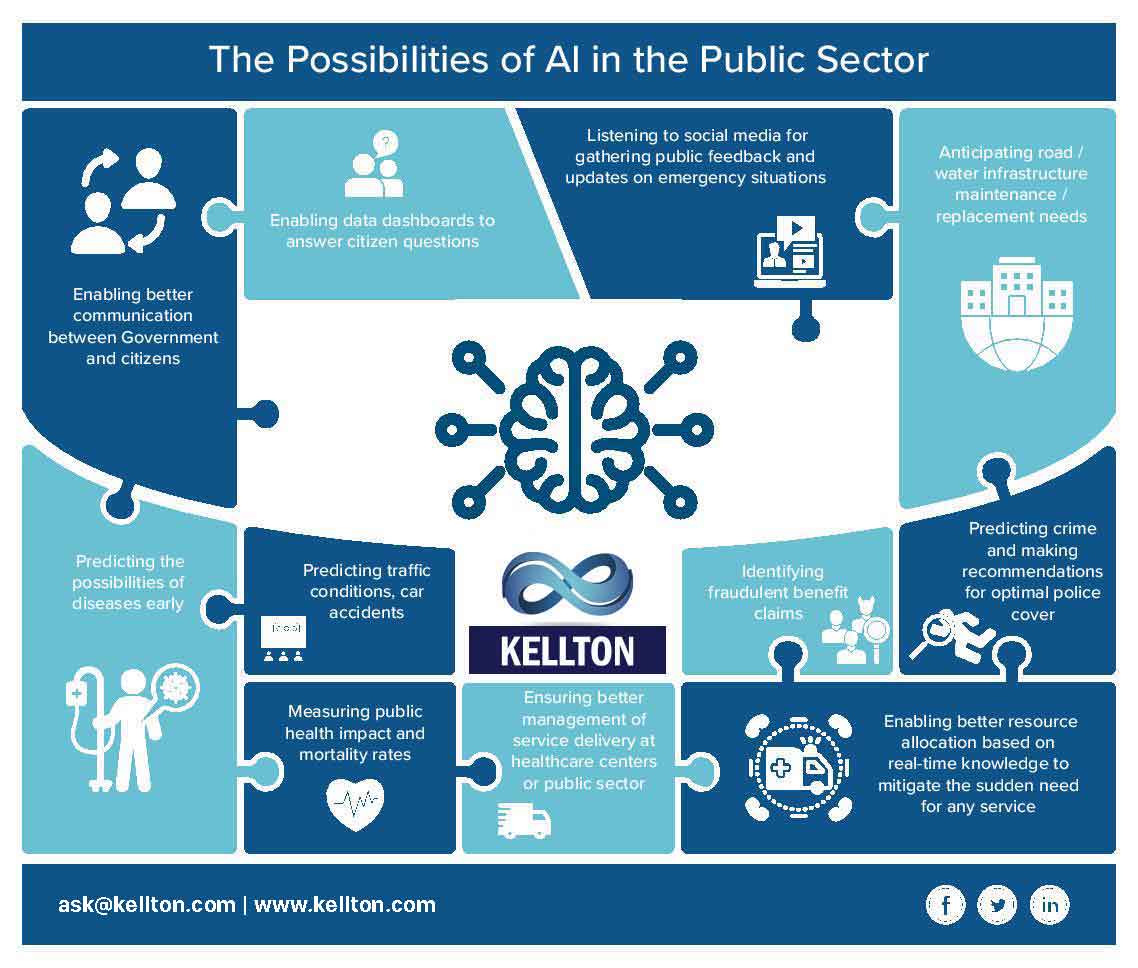Palantir And NATO: A New Deal Revolutionizing AI In Public Sector

Table of Contents
Enhanced Intelligence Gathering and Analysis
Palantir's flagship platform, Foundry, is at the heart of this transformative partnership. Foundry's ability to integrate and analyze massive datasets from diverse sources – intelligence reports, sensor data, social media feeds, and more – significantly enhances NATO's intelligence capabilities. This integrated approach allows for a level of real-time situational awareness previously unattainable.
- Improved real-time threat assessment: Foundry's powerful analytics engine quickly identifies and prioritizes potential threats, enabling faster and more informed decision-making. This real-time threat assessment is crucial for preemptive action and minimizing risks.
- Faster identification of patterns and anomalies: The platform's ability to sift through enormous volumes of data identifies subtle patterns and anomalies that might otherwise go unnoticed, providing critical insights into emerging threats and adversary activities.
- Enhanced predictive modeling for potential threats: By leveraging machine learning algorithms, Foundry can develop predictive models to forecast potential threats, allowing NATO to proactively address emerging risks. This predictive policing capability represents a significant advancement in security preparedness.
- Streamlined information sharing among member states: Foundry facilitates seamless information sharing across NATO member states, breaking down data silos and fostering a more collaborative intelligence ecosystem. This enhanced information sharing is essential for coordinated responses to transnational threats.
These capabilities underscore the transformative potential of Palantir Foundry for NATO intelligence, offering a significant leap forward in data analytics and real-time threat assessment.
Streamlined Operational Efficiency Across NATO
Beyond intelligence gathering, Palantir's technology is streamlining NATO's operational processes, impacting everything from logistics to resource allocation. The platform's ability to visualize complex data sets and identify bottlenecks provides valuable insights for optimization.
- Improved supply chain management: Foundry provides real-time visibility into the NATO supply chain, enabling more efficient resource management and reducing logistical delays. This optimized supply chain management is crucial for timely response during crises.
- Optimized resource deployment during crises: During emergencies, Foundry helps optimize resource deployment by providing data-driven insights into the most effective allocation of personnel and equipment, ensuring efficient and targeted responses.
- Enhanced coordination among different NATO commands: The platform improves communication and collaboration among different NATO commands, facilitating more coordinated and effective responses to challenges.
- Reduced administrative overhead: By automating various administrative tasks, Foundry frees up personnel to focus on core missions, improving overall operational efficiency.
The Palantir platform is proving instrumental in boosting NATO operations, optimizing resource allocation, and enhancing overall efficiency.
Addressing the Challenges and Ethical Considerations
The Palantir-NATO partnership, while promising, raises crucial ethical considerations. Concerns about data privacy, security, and algorithmic bias must be addressed proactively.
- Data privacy safeguards and compliance regulations: Robust data privacy safeguards and strict adherence to relevant regulations are paramount to ensure the ethical use of sensitive data. Transparency and accountability mechanisms are vital.
- Transparency in algorithmic decision-making: Understanding how algorithms make decisions is crucial for ensuring fairness and avoiding unintended consequences. Explainable AI (XAI) techniques are necessary for building trust and accountability.
- Mitigation of potential biases in AI-driven analyses: Algorithmic bias can lead to unfair or discriminatory outcomes. Careful data curation, algorithm design, and ongoing monitoring are needed to mitigate this risk.
- Accountability mechanisms for algorithmic outcomes: Clear lines of accountability must be established for the outcomes generated by AI systems. This includes mechanisms for addressing errors and ensuring redress for individuals affected by algorithmic decisions.
Addressing these ethical challenges is vital for maintaining public trust and ensuring the responsible development and deployment of AI within NATO.
The Future of AI in Public Sector: Lessons from the Palantir-NATO Deal
The Palantir-NATO partnership offers valuable lessons for the broader adoption of AI within the public sector. Its success could pave the way for similar initiatives globally, transforming how governments operate.
- Potential applications in other government agencies: The insights gained from this collaboration can be applied to other government agencies, enhancing services across areas such as public health, disaster response, and law enforcement.
- Impact on national security strategies: AI-driven capabilities are increasingly shaping national security strategies, and this partnership provides a model for integrating AI into defense and security operations.
- Development of new AI capabilities and applications: The partnership will likely drive innovation in AI, leading to the development of new capabilities and applications with broader societal benefits.
- The evolution of public-private partnerships in the AI space: This collaboration exemplifies the growing importance of public-private partnerships in the development and deployment of AI solutions within the public sector.
The Palantir and NATO deal represents a significant step towards a future where AI plays a transformative role in public service.
Conclusion:
The partnership between Palantir and NATO demonstrates the immense potential of AI to revolutionize public sector operations. From enhancing intelligence gathering and analysis to streamlining operational efficiency, the benefits are considerable. However, careful consideration of ethical challenges is paramount to ensure responsible development and deployment. To learn more about the transformative power of Palantir and NATO's collaboration and how similar partnerships can revolutionize your organization's use of AI, explore further resources on AI in government and public-private partnerships. The future of public service is being shaped by AI, and the Palantir and NATO deal serves as a compelling example of this evolution.

Featured Posts
-
 Tang Cuong Giam Sat Ngan Chan Bao Hanh Tre Em Tai Cac Co So Giu Tre Tu Nhan
May 09, 2025
Tang Cuong Giam Sat Ngan Chan Bao Hanh Tre Em Tai Cac Co So Giu Tre Tu Nhan
May 09, 2025 -
 Will Apples Ai Strategy Lead Or Lag
May 09, 2025
Will Apples Ai Strategy Lead Or Lag
May 09, 2025 -
 Participer A Une Collecte De Cheveux A Dijon
May 09, 2025
Participer A Une Collecte De Cheveux A Dijon
May 09, 2025 -
 Analyzing Doohans Path Jolyon Palmers Post Colapinto Appointment Assessment
May 09, 2025
Analyzing Doohans Path Jolyon Palmers Post Colapinto Appointment Assessment
May 09, 2025 -
 Red Bulls Driver Dilemma Colapinto Vs Lawson
May 09, 2025
Red Bulls Driver Dilemma Colapinto Vs Lawson
May 09, 2025
Latest Posts
-
 France Demands Stronger Eu Response To Us Tariffs
May 09, 2025
France Demands Stronger Eu Response To Us Tariffs
May 09, 2025 -
 Strengthening The Eu Response To Us Tariffs A French Ministers Plea
May 09, 2025
Strengthening The Eu Response To Us Tariffs A French Ministers Plea
May 09, 2025 -
 Further Eu Action Needed On Us Tariffs Says French Minister
May 09, 2025
Further Eu Action Needed On Us Tariffs Says French Minister
May 09, 2025 -
 French Minister Urges More Aggressive Eu Action Against Us Tariffs
May 09, 2025
French Minister Urges More Aggressive Eu Action Against Us Tariffs
May 09, 2025 -
 Eus Response To Us Tariffs French Minister Advocates For Stronger Action
May 09, 2025
Eus Response To Us Tariffs French Minister Advocates For Stronger Action
May 09, 2025
